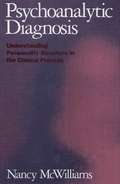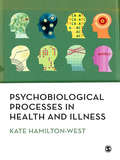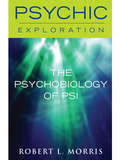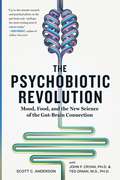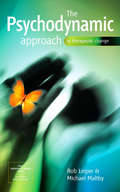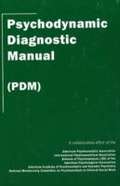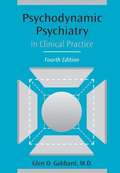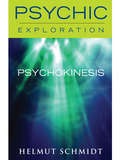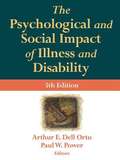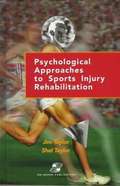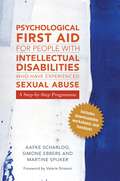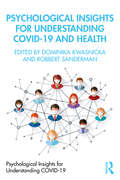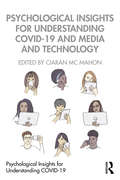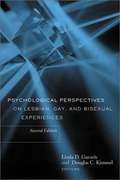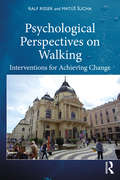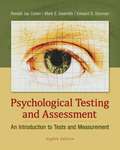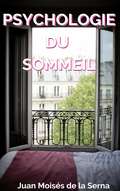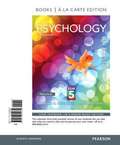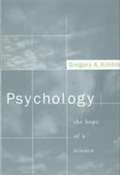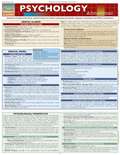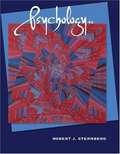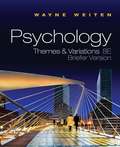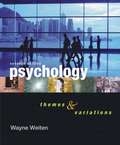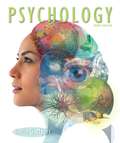- Table View
- List View
Psychoanalytic Diagnosis: Understanding Personality Structure in the Clinical Process
by Nancy McwilliamsPresents a psychoanalytic personality theory and its implications for beginning practitioners. Explains the major clinically important character types and suggest how an appreciation of individual personality structure should influence the therapist's style of intervention. Covers conceptual issues such as developmental levels of personality organization, primary and secondary defensive processes, types of character organization, borderline syndromes, and dissociative disorders.
Psychoanalytic Theories of Development: An Integration
by Phyllis Tyson Robert L. TysonThorough review of psychological development starting at infancy going through adulthood with emphasis on major developmental milestones.
Psychobiological Processes in Health and Illness
by Kate Hamilton-WestAn engaging introduction to the interrelationships between mind and body across a broad range of topics including infectious illness, autoimmunity, cancer and pain. Taking a biopsychosocial approach, it brings together research from a number of disciplines including health psychology, psychoneuroimmunology and behavioural genetics.<P><P> Students are encouraged to consider how advances in psychobiological research can help us to uncover the true complexity of links between psychological, biological and social processes with respect to implications for health and how such advances can inform the development of interventions and treatment.
The Psychobiology of Psi
by Robert L. MorrisThis essay, chapter 9 of Psychic Exploration, concerns itself with the processing of psi information once it is within the organism, from a psychobiological perspective. The full volume of Psychic Exploration can be purchased as an ebook or paperback version from all major online retailers and at cosimobooks.com.
The Psychobiotic Revolution: Mood, Food, and the New Science of the Gut-Brain Connection
by John F. Cryan Scott C. Anderson Ted DinanWritten by the leading researchers in the field, this information-rich guide to improving your mood explains how gut health drives psychological well-being, and how depression and anxiety can be relieved by adjusting your intestinal bacteria. This groundbreaking book explains the revolutionary new science of psychobiotics and the discovery that your brain health and state of mind are intimately connected to your microbiome, that four-pound population of microbes living inside your intestines. Leading medical researchers John F. Cryan and Ted Dinan, working with veteran journalist Scott C. Anderson, explain how common mental health problems, particularly depression and anxiety, can be improved by caring for the intestinal microbiome. Science is proving that a healthy gut means a healthy mind—and this book details the steps you can take to change your mood and improve your life by nurturing your microbiome.
The Psychodynamic Approach to Therapeutic Change (SAGE Therapeutic Change Series)
by Rob Leiper Michael Maltby`It is well written and well organised and I'm sure it will be of help and interest to researchers and practitioners concerned with the therapeutic action of psychodynamic treatment' - Penelope Waite, Nurturing Potential Change is the central purpose of all counselling and psychotherapy, but how it is conceptualized and worked with varies according to the theoretical approach being used. The Psychodynamic Approach to Therapeutic Change explores the nature of psychological change from the psychodynamic perspective and describes the process through which clients can be helped to come to terms with painful experiences and develop new ways of relating. In the first part of the book, Rob Leiper and Michael Maltby look at therapeutic change in relation to psychological health and maturity. They explore what motivates people to change and also why resistance occurs. The main part of the book outlines the collaborative process that clients and therapist work through to bring about change and highlights the role of the therapist in: ] creating the conditions for clients to express their thoughts, feelings and memories ] developing clients' awareness and understanding of their psychological processes, and ] providing `containment' for the client's psychological projections. The final part of the book sets personal therapeutic change in a wider social context, linking individual change with community and organisational development. Combining core psychodynamic concepts with contemporary thinking, The Psychodynamic Approach to Therapeutic Change provides a lively and up-to-date integration of ideas on the change process which will be of great value to trainees and practicing counsellors and psychotherapists.
Psychodynamic Diagnostic Manual
by Alliance of Psychoanalytic OrganizationsThis manual is based on current neuroscience and treatment outcome studies that demonstrate the importance of focusing on the full range and depth of emotional and social functioning. Beginning with a classification of the spectrum of personality patterns and disorders found in individuals and then describing a profile of mental functioning that permits a clinician to look in detail at each of the patient's capacities, the entries include a description of the patient's symptoms with a focus on the patient's internal experiences as well as surface behaviors. Intended to expand on the DSM (Diagnostic and Statistical Manual of Mental Disorders)and ICD (International Statistical Classification of Diseases and Related Health Problems) efforts in cataloging the symptoms and behaviors of mental health patients, this manual opens the door to a fuller understanding of the functioning of the mind, brain, and their development.
Psychodynamic Psychiatry in Clinical Practice (4th edition)
by Glen O. GabbardThe book introduces the basic principles of psychodynamic psychiatry and the four fundamental theoretical frameworks derived from psychoanalytic theory: ego psychology, object relations theory, self psychology, and attachment theory.
Psychokinesis
by Helmut SchmidtDuring the last four decades, careful laboratory work has shown that man can, to a certain degree, influence the outside world by pure thought. This process is called psychokinesis (PK). This essay, chapter 7 from Psychic Exploration, delves into this very subject. The full volume of Psychic Exploration can be purchased as an ebook or paperback version from all major online retailers and at cosimobooks.com.
The Psychological and Social Impact of Illness and Disability (5th Edition)
by Paul W. Power Arthur E. Dell OrtoThis collection, which defines disability very broadly to include post-traumatic stress and normal aging, includes classic articles and discussion questions as well as new material on illness. With a few exceptions it concentrates on the needs of caregivers and those who seek to rehabilitate people with disabilities. Therefore articles cover such issues as definitions of disability and current or past models, shifts in expectations of care demanded by the disabled, perceptions of stages of adjustment to disability, differences in the experience of men and women, the difficulties in discerning the quality of life from outside disability, sexuality, methods of intervention and treatment to promote acceptance o a disability, family issues surrounding life and death, special resources such as assistive technology and spirituality, new applications of eugenics and euthanasia, and "quality aging." Includes exercises and narratives about disability, primarily by caregivers.
Psychological Approaches to Sports Injury Rehabilitation
by Jim Taylor Shel TaylorIn dedicating this guide for rehabilitation specialists, consultants J. Taylor and S. Taylor (U. of Connecticut Health Center, Farmington) refer to frustration and patience as well as to pain and expertise, recognizing that bouncing back from sidelining sports injuries entails mind as well as body. Augmented by celebrity soundbites, the authors detail the referral process for assessing psychological problems; mental influences on rehabilitation (motivation, anxiety, focus); facilitatitive techniques (imagery, using negative thinking positively, pain management, social support); return to the sport; and development of a psychological rehab program (with sample forms, program prescription summaries). Annotation c. by Book News, Inc., Portland, Or.
Psychological First Aid for People with Intellectual Disabilities Who Have Experienced Sexual Abuse: A Step-by-Step Programme
by Valerie Sinason Simone Ebbers-Mennink Martine Spijker-van Vuren Aafke ScharlooPeople with intellectual disabilities are particularly vulnerable to sexual abuse, and offering them psychological support at the earliest possible moment greatly increases their ability to cope with the event and return to daily life. This book provides a complete, structured, evidence-based programme for providing this help to survivors of sexual abuse with developmental disabilities, both adults and children. Step-by-step session plans, as well as comprehensive background information and downloadable worksheets, provide the means by which to offer effective help to clients and recover their feelings of safety and trust. Sessions are also included for helping parents and caregivers to cope with their own reactions and emotions on the discovery of the abuse. Each session is adaptable for the needs of people with severe, moderate and mild intellectual disabilities in order to provide exceptional care to every individual who needs it.
Psychological Insights for Understanding Covid-19 and Health (Psychological Insights for Understanding COVID-19)
by Dominika Kwasnicka; Robbert SandermanWith specially commissioned introductions from international experts, the Psychological Insights for Understanding COVID-19 series draws together previously published chapters on key themes in psychological science that engage with people’s unprecedented experience of the pandemic. In this volume on health, Dominika Kwasnicka and Robbert Sanderman introduce chapters that explore the crucial topics of health behaviour change, wellbeing, stress, and coping. They highlight the key role digital health technologies can play in how we manage health conditions, and how we facilitate change to help individuals manage stressful situations such as physical isolation, job loss, and financial strain during the COVID-19 pandemic. The volume also offers an important overview of environmental and policy-based approaches to health behaviour change and addresses the highly relevant issues of identity and trust and how they shape the health of individuals, communities, and society. Highlighting theory and research on these key topics germane to the global pandemic, the Psychological Insights for Understanding COVID-19 series offers thought-provoking reading for professionals, students, academics, and policymakers concerned with psychological consequences of COVID-19 for individuals, families, and society.
Psychological Insights for Understanding COVID-19 and Media and Technology (Psychological Insights for Understanding COVID-19)
by Ciarán Mc MahonIn the Psychological Insights for Understanding COVID-19 series, international experts introduce important themes in psychological science that engage with people’s unprecedented experience of the pandemic, drawing together chapters as they originally appeared before COVID-19 descended on the world. This book explores how COVID-19 has impacted our relationship with media and technology, and chapters examine a range of topics including fake news, social media, conspiracy theories, belonging, online emotional lives and relationship formation, and identity. It shows the benefits media and technology can have in relation to coping with crises and navigating challenging situations, whilst also examining the potential pitfalls that emerge due to our increasing reliance on them. In a world where the cyberpsychological space is constantly developing, this volume exposes the complexities surrounding the interaction of human psychology with media and technology, and reflects on what this might look like in the future. Featuring theory and research on key topics germane to the global pandemic, the Psychological Insights for Understanding COVID-19 series offers thought-provoking reading for professionals, students, academics and policy makers concerned with the psychological consequences of COVID-19 for individuals, families and society.
Psychological Perspectives on Lesbian, Gay, and Bisexual Experiences (2nd edition)
by Linda D. Garnets Douglas C. KimmelThis textbook is a series of articles that provide a comprehensive overview of current thought about the psychological issues surrounding homosexuality and bisexuality.
Psychological Perspectives on Walking: Interventions for Achieving Change
by Ralf Risser Matúš ŠuchaPsychological Perspectives on Walking provides a comprehensive overview of the benefits of walking and shows how we can encourage people to walk more based on psychological principles. It examines how walking significantly improves health, positively impacts the environment, contributes to resolving social issues, and boosts the local micro-economy. This pioneering book discusses psychological motivations for walking versus not walking and asserts research-based arguments in favour of walking, including both theoretical considerations and everyday concerns. The book investigates the motivations that can lead to increased walking, advises on how to build walking-conducive habits, and recommends strategies for decision makers for promoting changes that will allow walking to thrive more easily. The authors include success stories and lessons learned from what have become known as 'walkable' cities to show how interventions and initiatives can succeed on a practical basis. This accessible, practical book is essential for urban planners; health specialists; policy makers; traffic experts; psychology, civil engineering, and social sciences students; and experts in the field of sustainable mobility. Psychological Perspectives on Walking will appeal to anyone in the general population in favour of a sustainable and healthy lifestyle.
Psychological Testing and Assessment: An Introduction to Tests and Measurement (Eighth Edition)
by Ronald Jay Cohen Mark E. Swerdlik Edward Sturman.Psychological Testing and Assessment presents students with a solid grounding in psychometrics and the world of testing and assessment. The book distinguishes itself through its logical organisation, readable text, and many pedagogical aids, such as the “Meet an Assessment Professional” feature in every chapter which highlights the works of people such as Dr. Stephen Finn, architect of therapeutic assessment. Now in its eighth edition, this text has consistently won enthusiastic reviews not only for its balance of breadth and depth of coverage, but for content that brings a human face to the assessment enterprise.
Psychologie du Sommeil
by Juan Moises de la SernaCet ebook parle de l'importance du sommeil, en particulier pour la santé mentale, ainsi que les problèmes associés à l'insomnie. Par-dessus tout, il présente les dernières techniques pour le surmonter. Tout le monde, à un moment donné de sa vie, a eu des problèmes qui l'ont «mis au lit» et qui lui ont empêché de dormir. Dans cet ebook, nous essayons d'offrir d'une manière simple les résultats des dernières recherches sur ce sujet afin que vous puissiez apprendre à améliorer la qualité de votre sommeil et ainsi avoir une vie plus épanouie. Un ebook conçu spécialement pour vous aider à dormir paisiblement durant vos 8 heures de sommeil quotidien.
Psychology: An Exploration with DSM5 Update
by Saundra Ciccarelli J. Noland WhiteUsing the most recent recommended APA undergraduate psychology learning outcomes, the authors establish clear learning objectives for students that are tied to these objectives. Student and instructors praise Ciccarelli and White's approach to teaching and learning in today's classroom. The thirteen-chapter table of contents covers the essentials that every introductory psychology student should know and fits easily into a one-semester course.
Psychology: The Hope of a Science
by Gregory A. KimbleAt a time in the history of psychology when many psychologists are troubled by the splintered condition of the field, Gregory Kimble proposes that the diverse perspectives in psychology share ways of thinking that can bring coherence to the discipline.
Psychology: Abnormal
by Albert E. LyngzeidetsonPsychology students and those already practicing in the field will want to obtain this jam-packed, 3-panel (6 page) expanded version of BarCharts popular Psychology: Abnormal guide. The new information, along with the original guide text, lists a variety of mental disorders and the therapies used to treat them; each color-coded section features key definitions and examples for easy reference.
Psychology: In Search of the Human Mind (4th Edition)
by Robert J. SternbergSternberg (psychology, Yale University) emphasizes the theme of unity in psychological sciences in this fourth edition. This edition has been edited for readability and interest, and includes new boxed features on how psychologists from different disciplines would treat the same condition. Also new are expanded quizzes, critical thinking questions, and chapter summaries. The CD- ROM contains animations, activities, and videos. Annotation (c)2003 Book News, Inc., Portland, OR (booknews.com)
Psychology: Themes and Variations (8th Edition)
by Wayne WeitenIn PSYCHOLOGY: THEMES AND VARIATIONS, BRIEFER VERSION, Wayne Weiten continues his proven combination of a scientifically rigorous text with selective pedagogy that makes learning easy for students. Weiten's approach is backed by a straightforward writing style, unparalleled in-text visuals and didactic art program, and in-book review to help users prioritize and retain the core concepts. Weiten surveys psychology's broad range of content with three aims: to illuminate the process of research and its intrinsic relationship to application (themes); to show both the unity and diversity of the subject (variations), and to invite users to the study of psychology by respecting their ability to master its fundamental concepts. Weiten's themes (including empiricism, theoretical diversity, sociohistorical contexts, multifactorial causation, cultural heritage, heredity and environment, and subjectivity of experience) and variations provide unifying threads across chapters that help users see the connections among different research areas in psychology.
Psychology: Themes and Variations (Seventh Edition)
by Wayne WeitenThe Seventh Edition of Wayne Weiten's popular text, Psychology: Themes and Variations, continues to offer students a unique survey of psychology with three distinct goals: to show both the unity and diversity of psychology's subject matter; to illuminate the process of research and its intimate link to application, and to make the text challenging to think about and easy to learn from.
Psychology (10th Edition)
by David G. MyersThe author and his team lead the field in being attuned to psychology's research and the needs of the instructors and students in the course today. This landmark new Tenth Edition is another vigorous, deeply considered revision. Added features of this tenth edition are: New Pedagogy--Retrieval Practice Questions; Over a Thousand New Research Citations; Reorganized Chapters; New Time Management Section; Beautiful New Design and Contemporary Photo Program, etc.
